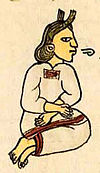Nahuatl is a group of related languages and dialects of the Aztecan, or Nahuan, branch of the Uto-Aztecan language family, all of which are indigenous to Mesoamerica and are spoken by an estimated 1.5 million Nahua people, mostly in Central Mexico. Nahuatl has been spoken in Central Mexico since at least the 7th century AD. At the time of the Spanish conquest of Mexico in the early 16th century it was the language of the Aztecs, who dominated central Mexico during the Late Postclassic period of Mesoamerican chronology. The expansion and influence of the Aztec Empire led to the dialect spoken by the Aztecs of Tenochtitlan becoming a prestige language in Mesoamerica in this period. With the introduction of the Latin alphabet, Nahuatl also became a literary language and many chronicles, grammars, works of poetry, administrative documents and codices were written in the 16th and 17th centuries. This early literary language based on the Tenochtitlan dialect has been labeled Classical Nahuatl and is among the most-studied and best-documented languages of the Americas. Today, Nahuan dialects are spoken in scattered communities mostly in rural areas. There are considerable differences between dialects and some are mutually unintelligible. No modern dialects are identical to Classical Nahuatl, but those spoken in and around the Valley of Mexico are generally more closely related to it than those on the periphery. (more...)
Recently featured: Battlefield Earth: A Saga of the Year 3000 – History of Minnesota – Flag of Germany

